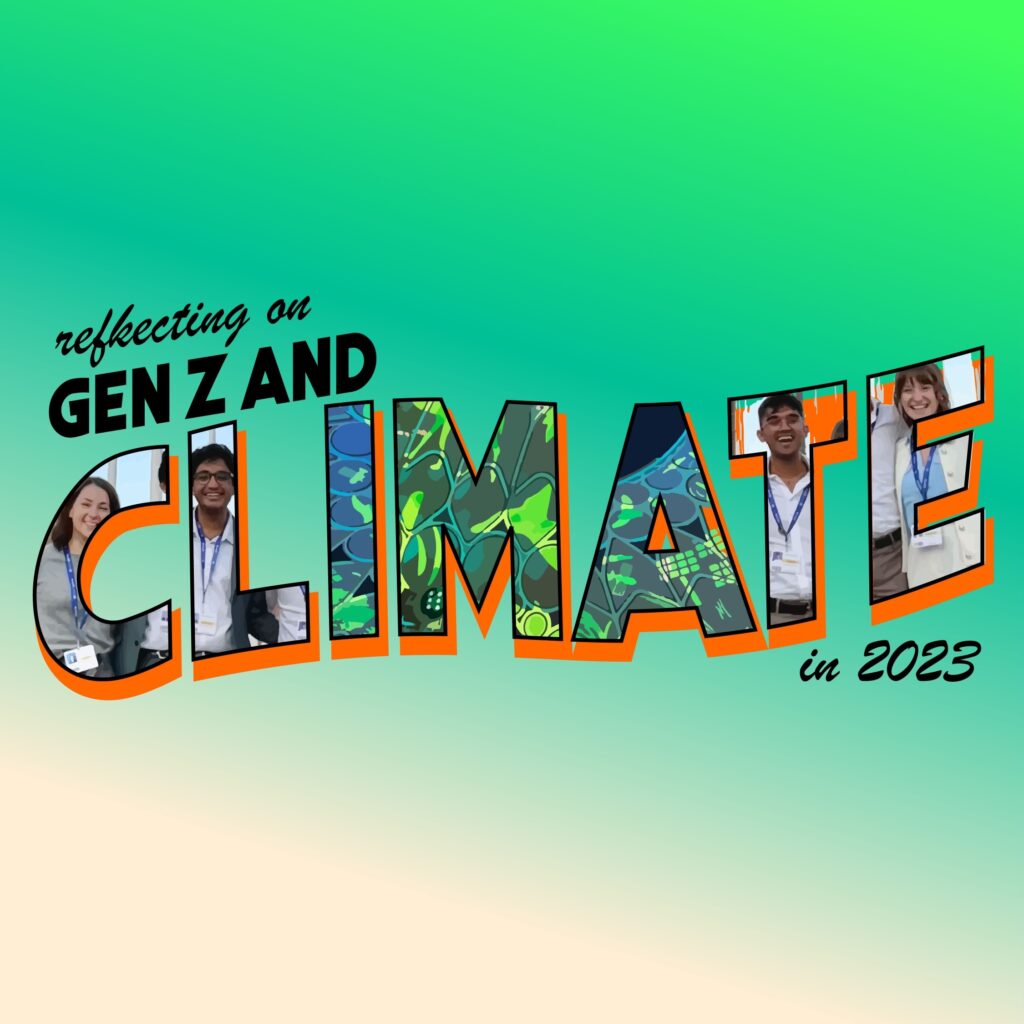On many fronts, 2023 was the year Gen Z took control of the climate activism narrative. Yet, at the world’s largest climate negotiations, their leadership was ignored at the planet’s peril.
Young people have assumed responsibility for the climate crisis that will govern their future, and this year saw them stepping into the spotlight as they held those in power accountable for their actions on critical climate issues. In Montana, sixteen young plaintiffs tallied a significant victory against fossil fuel pollution when they won a landmark case against the state affirming their right to a clean and healthful environment. In Mexico, youth organizers carried out a caravan-style tour visiting rural communities in the country’s southeastern region to listen to Indigenous perspectives and amplify their concerns to audiences throughout Latin America.

At local and regional levels, young people made their voices heard. But as the year concluded with buzzworthy climate talks at the United Nations’ 28th Conference of the Parties (COP28) in flashy, sun-soaked Dubai, the voices of young people were drowned out on the global stage.
With over 100,000 delegates attending this year’s summit, the participation at COP28 was close to double what it had been during previous years, setting the record for the largest conference of its kind, ever. Young people – whom the United Nations Framework Convention on Climate Change (UNFCCC) defines as children and youth under 35 years of age – made up a significant portion of the delegate demographic. This year, the UNFCCC also set aside an entire day of programming focused on Youth, Education, and Skills during the second week of the twelve-day conference.
From a distance, it appeared as though COP28 was making youth voices a priority. Inside the sprawling, Central-Park-sized conference venue, however, the story that emerged was different. Young people stood outside key negotiating rooms, denied seats at their delegations’ tables or entry to the spaces altogether. Turned away at the doors to these exclusive spaces, many young people resorted to sitting on the floor outside, hopeful that the spaces would open up to them and their UNFCCC Observer status badges. Even after young delegates raised the issue during week one at an Observers-only discussion with the COP28 President, Dr. Sultan Ahmed Al Jaber, official negotiations remained mostly cordoned off to young people.
“The participation of young people remains limited in the negotiations,” says Marco Yáñez Marín, a 29-year-old party delegate from Chile. “Not all countries consider including young negotiators in their delegations. More programs need to be created in each country to train young people qualified to represent their countries in climate change negotiations, bringing the missing voices to the negotiating tables.”
Without access to the rooms where decisions are being made – such as this year’s historic agreement on the transition away from fossil fuels worldwide – young people become accessories to a swarming entourage of world leaders and industry experts that critics have likened to a trade show rather than a multilateral effort on advancing climate policy.
In many ways, the criticism that COP28 endured about its size and flashiness is warranted. Among this year’s record-setting participants were thousands of delegates representing fossil fuel interests, from trade experts to members of the Organization of the Petroleum Exporting Countries (OPEC). If these fossil fuel delegates had together represented one country, their delegation would have been the third-largest at the conference.
It is in this context that COP28 fell short in achieving some of its own most ambitious goals. The attention surrounding the conference’s closing days and celebrating the final agreement for its language on fossil fuels distracts from the reality that the conference did not deliver on other priorities, including its pledge to listen to young people. While multilateral compromises like this year’s agreement are worth celebrating, we must not lose sight of the big picture.
In 2015, a goal was set in Paris to limit global warming to levels within 1.5ºC of preindustrial temperatures, with significant progress toward those ends expected by 2030. Now, scientists agree that goal may be slipping away. In 2030, young people – and particularly Gen Z – will certainly be at the helm of more leadership positions on the global stage.
Rahaf Abu Mayyaleh, a 21-year-old university student from Jordan, says she was able to express her opinions in many of the informal negotiations throughout the conference. However, she too was prevented from entering official negotiation rooms.
“[That] made me see that my participation as a young woman was limited,” says Mayyaleh.
By neglecting to listen to those who will inherit these global negotiations and suffer from the consequences of their inaction, COP28 failed to completely fulfill its commitment to young people. It is not enough to invite young people to the UN-secured Blue Zone and let them stand outside meeting rooms, holding hands in solidarity, protesting silently for tougher action on fossil fuels. It is not enough to relegate young people to side events and panels far away from the high-level negotiations they came for. It is not enough for negotiators from older generations to nod politely at youth constituency representatives handing out a flurry of draft language at doors they are barred from entering, urging those who can pass through to give the text their honest consideration.
Mayyaleh says she hopes to see a greater role for youth in the upcoming COPs that includes a “real role” in the official negotiations.
Marín, who has represented Chile as a youth party delegate since COP26, says that a position like his should be the norm, not the exception.
“Let this not be a privilege and something uncommon, but rather let it be normal to have the voices of young people negotiating those issues that will determine our future,” says Marín.
Evidence from this year alone suggests that letting young people speak for themselves can lead to significant climate wins that benefit not only youth but communities of all ages. Just ask the plaintiffs from Montana.



